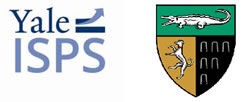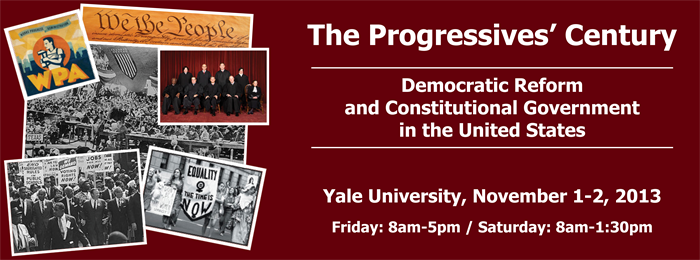The Progressive party faded quickly after the elections of 1912, but over the course the ensuing century, the progressives’ vision of a new democracy, one released from the constraints of the past and reorganized to pursue great national purposes, transformed the scope, structure, and operations of American government.
Today, progressivism is as controversial as ever. Many of the progressives’ prescriptions turned out to have consequences that were unintended and counterproductive, and even in their decades of greatest achievement, their reforms tended to finesse obstacles they could not completely overcome. A scholarly conference at Yale on Friday and Saturday, November 1-2, 2013 will provide an occasion to reflect on the progressives’ national project, on how its achievements and limitations have shaped government and politics today.
The Institution for Social and Policy Studies and the Yale Law School will host an eminent group of scholars who will revisit the assumptions of twentieth-century reform, evaluate their resilience (or exhaustion) in light of a century of practice, and consider alternative formulations that might plausibly advance the cause of democratic renewal. The conference will consist of 6 thematically integrated panels. It will give voice to a variety of political perspectives and disciplinary outlooks.
By the term, “Progressive,” we reference the general disposition toward government, politics, and law that runs through twentieth century reform. Among its leading features are faith in the problem-solving capacities of government, trust in the adaptability of received governmental arrangements, cultivation of an enlightened public opinion, and confidence in the consensus inducing potential of science, expertise, and professionalism. The central contention of progressive reform has been that the proper stance toward basic governing relationships should be instrumental and pragmatic, that institutions and legal arrangements that thwart the advance toward a more robust democratic community should be altered or discarded. Our conference will take a hard look at the transformation that has occurred under these guiding precepts. As the progressives’ stance toward received arrangements has recast American government and politics, it has raised a host of knotty questions about the enduring significance of residual structures and principles, about the consequences of loosening old constraints, and about the new discipline offered by progressive remedies. Our interest is in how the reformers’ principles interacted with older forms and arrangements, and at how the results now bear upon any practical movement forward.
Co-Chairs for this Conference:
Stephen Skowronek, Yale University
Bruce Ackerman, Yale Law School
Stephen Engel, Bates College
Sponsored by the Yale Institution for Social and Policy Studies and the Yale Law School.

